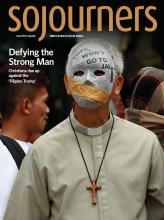LIVING IN THE United States in the first months of Donald Trump’s presidency often feels surreal, disorienting, and overwhelming, including to some people in positions of considerable responsibility and influence.
There are, of course, many reasons for this, and those who regularly read my columns can no doubt list many of the things that most perturb and anger me about this administration. Many of us are focused on our solidarity and support for those who are most vulnerable in the face of the new political realities. We have lifted up the Matthew 25 Pledge movement aimed at protecting undocumented immigrants threatened with deportation, African Americans and other people of color threatened with racialized policing, and Muslims threatened with xenophobic hatred and discrimination.
But a unifying theme of all of Trump’s outrages and threats is his brazen assault on the very concept of truth and objective, knowable facts. Amid everything that’s going on, consuming and interpreting the news each day is considerably more exhausting than it should be because it has never been more difficult to sort fact from fiction. While this isn’t entirely Trump’s doing, his almost daily falsehoods have the large platform and weight of the presidency to prop them up and pound the American people with persistent and pervasive lying.
This spring, the news cycle was thrown into turmoil for more than a month by Trump’s evidence-free allegations that his predecessor, Barack Obama, had illegally wiretapped Trump Tower during the campaign. The president lied, accusing his predecessor of a serious crime with no justification or evidence. Rather than retracting it and apologizing, Trump has tasked his administration and the intelligence community with finding any shred of evidence to retroactively justify his lie.
Read the Full Article

